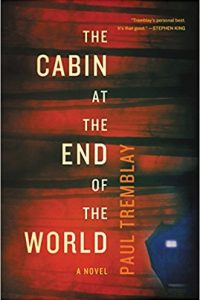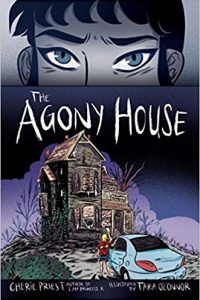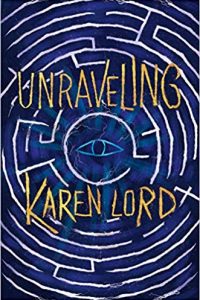State of Paradise by Laura van den Berg: Review by Ian Mond
 State of Paradise, Laura van den Berg (Farrar, Straus, Giroux 978-0-37461-220-7, $27.00, 224pp, hc) July 2024.
State of Paradise, Laura van den Berg (Farrar, Straus, Giroux 978-0-37461-220-7, $27.00, 224pp, hc) July 2024.
I move from one instance of weird Florida (Area X is a distorted version of North Florida) to another: Laura van den Berg’s State of Paradise. I’d say that reading VanderMeer and van den Berg back-to-back (alliterative surnames aside) is a remarkable coincidence, except that Florida, to outsiders such as myself, has always seemed a weird place (the “Florida Man” meme, unlike God, didn’t emerge ex nihilo). Van den Berg’s approach, though, isn’t to mock Florida – well, maybe Ron DeSantis, whom she calls “our Cro-Magnon governor” – but to embrace the strangeness while acknowledging that America’s twenty-seventh state, but our planet more broadly, has an uncertain future.
Our unnamed narrator lives with her husband and her mother in Orlando (“encircled by hardwood hammocks and cypress swamps, wetlands and salt marshes”). He’s an unemployed academic working on a book about pilgrimages, famous around town for his long walks. She’s a ghostwriter “for a very famous thriller author” (I immediately imagined James Patterson). Much of the novel’s humour stems from her relationship with the famous author’s assistants:
[The assistants send] templates of scenes, and then it’s up to me to fill in the details. Paint by numbers writing…. When I finish a chapter, I send it on to the assistants, who weed out anything of myself that I might have tried to smuggle in. If I submit chapters that are too well written – too descriptive, too vulnerable, too precise – the assistants become upset, tell me to cut the flourishes. They want the language to do the opposite of what language should do, which is to leave a mark. They want the language to be forgettable, digestible. To enter in the reader and disappear without a trace.
The narrator and her husband initially come to Florida to care for the narrator’s father, but he dies on the cusp of the pandemic, and they find themselves in lockdown. At this point, their experience seems very 2020, and the narrator’s reluctance to mention COVID seems more of an affectation than a plot point. But then we learn that during the pandemic, the narrator’s sister (who lives next door), along with thousands of other people, became addicted to MIND’S EYE, a VR headset owned by ELECTRA that was sent, free of charge to residents across Florida. (“An alleged act of public service to help people cope with the isolation”). We also learn that those people who spent most of their time in the virtual worlds furnished by MIND’S EYE have begun to vanish since the pandemic. Florida has also entered a postpandemic spiral, with “talk about militias creeping out of the swamp… talk of vandals… talk of literal highway robbery”, exacerbated by significant weather events and an invasion of feral cats. This is a Florida where even the Florida Man would struggle to compete with all the weirdness.
I enjoyed van den Berg’s previous novel, The Third Hotel, and her collection, I Hold a Wolf by the Ears. Like Jesse Ball (reviewed below), she appreciates the narrative possibilities of absurdist fiction, its capacity to inform and critique our everyday existence. But with State of Paradise, van den Berg has gone to another level. I was struck by how confidently and seamlessly the novel switches between the hilarious, the speculative, the surreal and the emotional. It’s evident in the way the book is arranged, with van den Berg adopting an epigrammatic style (a paragraph per scene) reminiscent of Jenny Offill (though written with more heart) that is both digestible (in accordance with the rules set down by the assistants), but in a language that’s vivid and thoughtful, that exhibits a fascination for the strange and the anomalous and is anything other than forgettable.
State of Paradise is a novel steeped in irony. It’s present in the novel’s title, structure, and attitude to dystopias. On the latter, the term “dystopia” never once appears. In contrast, its antonym, “utopia” or “utopian,” features close to 20 times, mostly in relation to the narrator’s mother, who is fascinated by the topic and at one point is reading Francis Bacon’s incomplete utopian novel, New Atlantis. (She even starts a cult with the tagline: “SAVE THE EARTH DON’T GIVE BIRTH”). The author’s approach seems deliberately provocative, as if she’s saying that dystopias are just utopias in disguise. But it’s nothing so banal. In the words of her narrator, a utopia “is a thing that rises from disaster, ruin, rubble. Without all that failure there can be no such thing as a utopia, since there would be no other reality to compare it to.” It’s an ideology I want to push back against; I want to believe that we don’t need to blow up society to fix it. But it’s getting harder to think that any sort of incrementalism will work. Moreso than any point in the last decade, including the shit show that was 2016 and the Trump Presidency, I think we’re as close as ever to tipping into outright fascism (and I hate labelling everyone a Nazi). What’s so disconcerting about State of Paradise is that by novel’s end, the narrator and her family have come to accept the new normal and have found ways of accommodating the dystopian into their everyday life. The irony has been stripped away, and what’s left is the unvarnished and uncomfortable truth laid bare.
Interested in this title? Your purchase through the links below brings us a small amount of affiliate income and helps us keep doing all the reviews you love to read!
Ian Mond loves to talk about books. For eight years he co-hosted a book podcast, The Writer and the Critic, with Kirstyn McDermott. Recently he has revived his blog, The Hysterical Hamster, and is again posting mostly vulgar reviews on an eclectic range of literary and genre novels. You can also follow Ian on Twitter (@Mondyboy) or contact him at mondyboy74@gmail.com.
This review and more like it in the October 2024 issue of Locus.
 While you are here, please take a moment to support Locus with a one-time or recurring donation. We rely on reader donations to keep the magazine and site going, and would like to keep the site paywall free, but WE NEED YOUR FINANCIAL SUPPORT to continue quality coverage of the science fiction and fantasy field.
While you are here, please take a moment to support Locus with a one-time or recurring donation. We rely on reader donations to keep the magazine and site going, and would like to keep the site paywall free, but WE NEED YOUR FINANCIAL SUPPORT to continue quality coverage of the science fiction and fantasy field.
©Locus Magazine. Copyrighted material may not be republished without permission of LSFF.









